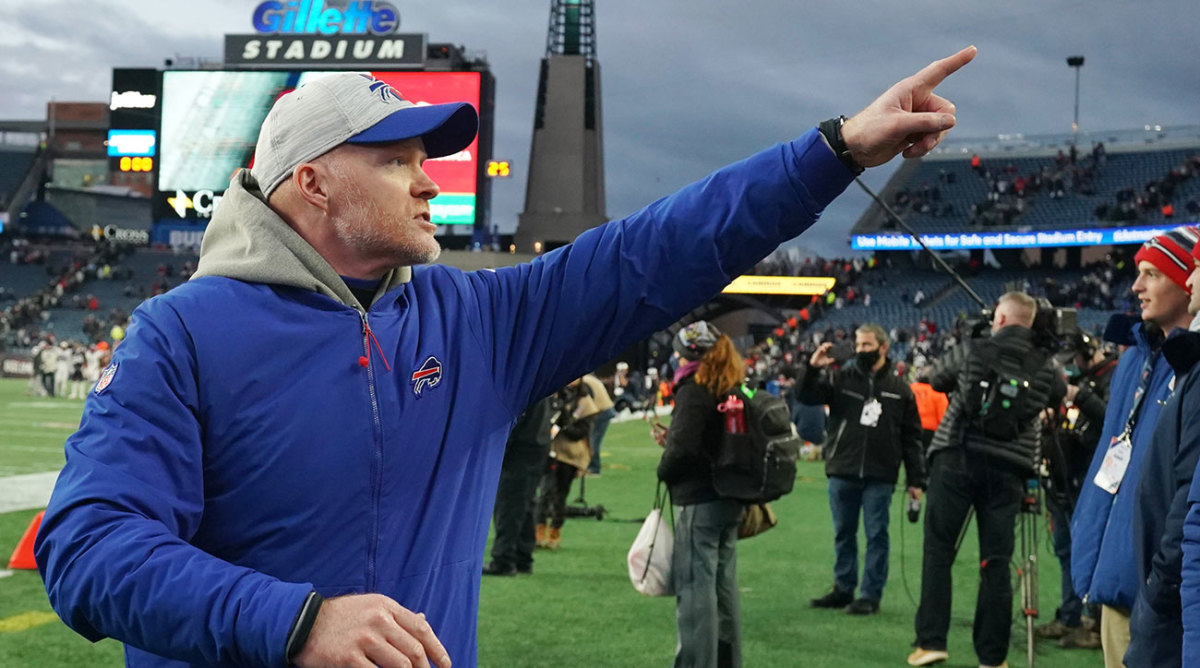Sean McDermott Is Not Bill Belichick, but He's Proven to Be a Worthy Adversary

Three weeks ago, when the Patriots dressed down the Bills in Buffalo with a three-pass performance that seemed to be more of an attempt at demoralization than an actual game plan, it looked like Bill Belichick was casting his division rival completely adrift with the intention that they would arrive in Foxborough for the Week 16 rematch too emotionally battered to mount a comeback.
Sean McDermott was flustered, downplaying Belichick’s role in the win. The Bills’ best defensive players were flustered, staging a miniature coup against a tenured beat reporter at the postgame press conference (something they didn’t forget about after this week, by the way). They went on to lose their next game to the Buccaneers before recovering, like everyone seems to do now, against the Panthers.
But on Sunday, in a 33–21 win over the Patriots in Foxboro that hoisted Buffalo back to the No. 4 seed and knocked New England down to sixth in the AFC, they managed to do something beautiful and somewhat unfathomable just a short time ago: deliver a counterpunch that, to Belichick and the Patriots, was equally as demoralizing and harmful to their perception of who they were. It was the kind of win that lingers like an errant popcorn kernel superglued to a back tooth.

Belichick was the first coach since the early 1970s to win a game in which his team threw three passes or fewer, which, at the time, blew open the falsehood that Buffalo was a stout run defense and stripped them somewhat of their core identity. McDermott was the first coach ever to log a completely puntless game against Belichick, one of the best defensive minds in football, with game plans that are displayed in the Hall of Fame.
Neither of these relatively insignificant factoids are going to bother these coaches as individuals. Both have survived as NFL coaches for as long as they have due to their ability to compartmentalize and surgically remove the extraneous noise that tends to consume less successful coaches. But evidenced by Jordan Poyer’s reaction coming off the field Sunday, still referencing a question he didn’t like after the previous loss to New England, or even Josh Allen’s reaction for that matter (“I don’t know who the f--- they thought I was!” he screamed as he entered the locker room), the way in which games are won contributes to a general narrative that exists in these players’ lives, omnipresent like oxygen and that stale beer stadium smell. It’s impossible for them to ignore it.
While he was only briefly successful at it, former Jets head coach Rex Ryan recognized the importance of return fire in the psychological battle against Belichick. For most of his tenure in New England, Belichick abided by the strategy of elite marathoner Eliud Kipchoge: Lead out front methodically and never, for a moment, wince or show any evidence of discomfort. Ryan liked to take the stress off his players and make the game about himself, allowing them to come into games free of friendly fire wounds or outsized, burdensome expectations.
McDermott seemed to understand that Sunday, punching across a fourth-and-1 from New England’s 33-yard line instead of risking a 50-yard field goal or—gasp—punting the ball at that point and pinning Mac Jones impossibly deep. In both of his critical fourth-and-short situations Sunday, he opted for the more aggressive and potentially damaging option.
The wonderful part about all of this? It feels sustainable. Ryan’s act always had an expiration date. It was great. It worked. It was impossible to replicate over a long period of time. McDermott, on the other hand, doesn’t have to step to the podium and loudly declare that he won’t “kiss Belichick’s rings.” He has to mumble something about Belichick’s not being responsible for gale-force winds and then come back a few weeks later with the game plan equivalent of an opening-bell punch to the nose.
McDermott is not Belichick, but with Sunday’s win he has proven to be a worthy adversary capable of creating a long-term divisional rivalry, which is all we’ve asked of the AFC East for the last 20 or so years. Should the pair meet again this season—or even if they don’t—New England will have to slog through weeks of questioning about how the league’s No. 1 defense couldn’t force a punt. How they were broken open by the emergence of Cole Beasley’s more-than-capable backup, Isaiah McKenzie, who caught 11 of 12 targets for 125 yards and a score. Maybe no Patriots player is going to dress down a reporter, but just like the emotional damage they inflicted on the Bills, they’ll have something to work through as they try to maintain their playoff seeding. That’s not insignificant.
More NFL Coverage:
• Baker Mayfield Critics Are Neglecting Cleveland’s History
• A Look at the Holiday Gifts NFL Players Give and Get
• Bengals Already Better Than in Marvin Lewis Era
• How Jakob Johnson Is Helping Define the Post–Tom Brady Patriots
